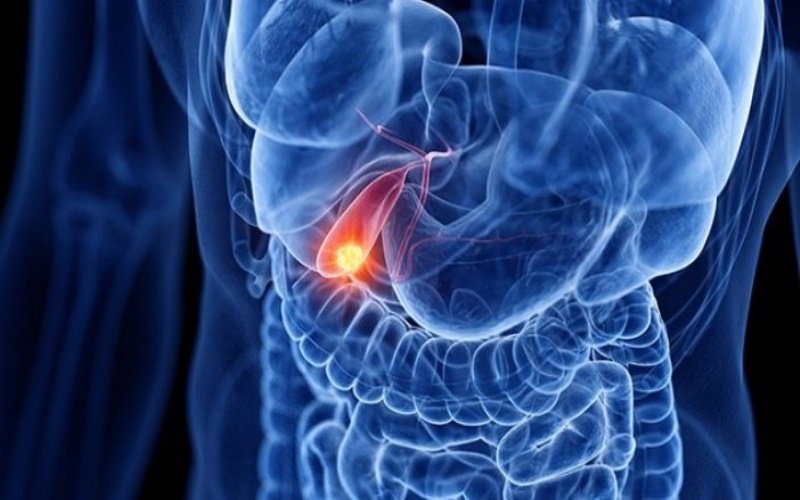Gallbladder cancer is an abnormal growth of cells in the gallbladder. It is uncommon and often diagnosed late which makes its prognosis poor.
The exact cause of gallbladder cancer is unclear. However, it begins when healthy cells in the gallbladder develop DNA mutations. These changes cause cells to grow uncontrollably and in the process, form a tumor that can spread.
Symptoms often appear late and may include abdominal pain, nausea, jaundice, and weight loss. Risk factors for gallbladder cancer include being female, older age, a history of gallstones, and other gallbladder conditions.
This page explores options for gallbladder cancer screening in Singapore. Also, it answers the question; is gallbladder completely curable? Keep reading!
What is the Screening Test for Gallbladder Cancer?
Gallbladder cancer is quite aggressive. So if you’re worried about your risks for gallbladder cancer you may want to know what the specific screening tests for gallbladder cancer are.
Now, screening for gallbladder cancer is generally not recommended due to the lack of reliable early indicators. Most gallbladder cancers are discovered only after they cause symptoms, which can be similar to other conditions.
However, if your doctor suspects gallbladder cancer, they may order tests to evaluate symptoms or confirm a diagnosis. The tests for gallbladder cancer include;
· Scans
Scans play a crucial role in detecting gallbladder cancer. An ultrasound scan, including an endoscopic ultrasound for example, helps visualize the gallbladder and nearby structures.
A CT scan provides detailed cross-sectional images, while an MRI scan offers a high-contrast view of soft tissues. A PET scan can detect cancerous activity by highlighting areas of high glucose uptake. Cholangiography which is a specialized X-ray, visualizes the bile ducts and can identify blockages or tumors that affect the gallbladder.
· Blood Tests
Blood tests cannot only indicate liver function. They can also help detect the presence of cancer markers.
Elevated levels of bilirubin, liver enzymes, and cancer antigens like CA 19-9 for example, can suggest gallbladder cancer or related conditions. These tests help in assessing overall health and identifying potential issues in the liver or bile ducts, which are often affected by gallbladder cancer.
· ERCP (Endoscopic Retrograde Cholangiopancreatography)
This test combines endoscopy and fluoroscopy to examine the bile ducts. During ERCP, a flexible tube with a camera is inserted through the mouth to the small intestine.
Here, a dye is injected to highlight the bile ducts on X-rays. This helps detect blockages or tumors and allows for biopsies if necessary.
· Biopsy
A biopsy involves collecting a small sample of cells from the gallbladder to check for cancer. It can be done via fine-needle aspiration.
For fine-needle aspiration, a needle is guided by imaging scans to collect tissue. The sample is then examined under a microscope to confirm the presence of cancer cells.
· Laparoscopy
A laparoscopy is a minimally invasive procedure where a small incision is made in the abdomen to insert a laparoscope. A laparoscope is essentially a thin tube with a camera that helps in the assessment of the inside of the body.
Guided correctly, this tool allows doctors to directly view the gallbladder and surrounding organs. It also allows for an assessment of the extent of the disease, and obtaining of tissue samples if needed.
Can you be cured of Gallbladder Cancer?
Receiving the news of having gallbladder cancer can be daunting. This explains why so many people incessantly search online; is gallbladder cancer curable? Or, can you be cured of gallbladder cancer?
Now, gallbladder cancer treatment outcomes are hugely dependent on the stage at diagnosis. When caught early and surgically removed, there’s potential for gallbladder cancer recovery.
The problem is that diagnosis often occurs in advanced stages which significantly limit curative options. For instance if you’re undergoing surgery for stage II gallbladder cancer, you may face high recurrence rates of up to 50% within two years.
Advanced cases typically carry a poor prognosis, with survival rates averaging less than a year. In cases where cancer has spread, you may be put into palliative care where the focus is on enhancing your quality of life by managing symptoms and complications.
You will be assigned a specialized palliative care team, including doctors and nurses to provide crucial support to both you and your family during this challenging time. The palliative care team will prioritize comfort and comprehensive support.
Also, a multidisciplinary approach that involves various specialists including surgeons, gastroenterologists, oncologists, radiologists, clinical nurse specialists, and pathologists can be hugely helpful. This team will work together to tailor treatment plans to your unique needs considering the cancer’s stage, your overall health, and personal preferences.
Can you have your Gallbladder Removed if you have Cancer?
When thinking about what next after gallbladder cancer diagnosis you may wonder if there is any possibility of having your gallbladder removed to help with the cancer. The answer is yes.
If you have gallbladder cancer, you can have surgery to remove the gallbladder. This procedure is known as a cholecystectomy but the decision to proceed with surgery depends on celebson the stage and extent of the cancer.
For early-stage gallbladder cancer that is confined to the gallbladder, a surgical approach is often recommended. There are two main types of cholecystectomy procedures:
- Simple Cholecystectomy: This procedure involves removing only the gallbladder itself. It is typically sufficient for early-stage cancers that have not spread beyond the gallbladder.
- Extended Cholecystectomy: In cases where the cancer has spread beyond the gallbladder, an extended cholecystectomy may be necessary. This procedure removes not only the gallbladder but also some surrounding tissues, such as part of the liver, bile ducts, or nearby lymph nodes.
Following surgery, you may be recommended additional treatments like radiation therapy and chemotherapy to reduce the risk of cancer recurrence. These treatments help target any remaining cancer cells that might not have been removed during surgery.
The choice between laparoscopic (minimally invasive) and open cholecystectomy depends on various factors, including the stage of cancer and the patient’s overall health. Laparoscopic surgery generally results in fewer side effects and a quicker recovery compared to open surgery, which requires a larger incision and may involve more post-operative discomfort.
Please discuss all treatment options, including the potential benefits and risks of surgery with your healthcare team for personalized advice based on your specific situation. If you’re considering surgery for gallbladder cancer be sure to understand these options so that you can make informed decisions about your treatment plan.
The Bottom Line
While early detection and intervention offer the best chance of a cure for gallbladder cancer, advanced cases often necessitate palliative care to enhance quality of life. If diagnosed with the condition, you will need a coordinated, multidisciplinary team approach to ensure comprehensive support and personalized treatment strategies plan to optimize outcomes and comfort.
Are you wondering about you or a loved one’s risks of gallbladder cancer and wish to meet a specialist to discuss your concerns? Please, visit our office today or give us a call to schedule an appointment. Find our contact details below;
Dr. Lee Chin Li-Lee Surgery and Endoscopy | Colorectal Surgery | Gallbladder Surgery Singapore
6 Napier Rd, #04-16 Gleneagles Medical Centre,
Singapore 258499



